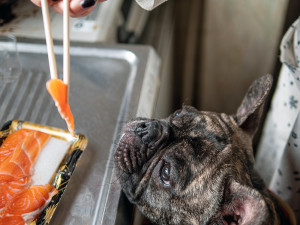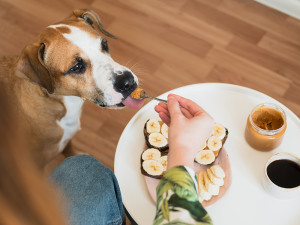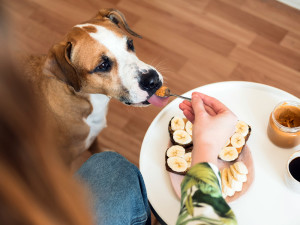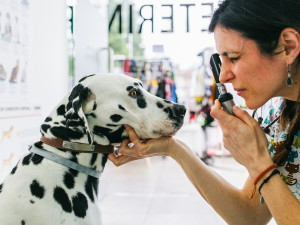
Share Article
In This Article:
Do Dogs Have Taste Buds? Do Dogs Like Sweets? Should Dogs Eat Sweets? Sweets Dogs Can Eat Sweets Dogs Can’t Eat
Have you ever wondered if your pup can taste that sweet treat you’re offering? The topic of dogs and sugar sensitivity is a fascinating one that delves into the complexities of canine taste buds and their responses to different flavors. And while the short answer is that dogs can and do appreciate the taste of something sweet, it’s important to also ask yourself whether you should share that sweet treat with your pup. Read on to learn all about dogs and sweets.
Can dogs taste sugar?
As you likely have experienced for yourself, taste is a complex experience. It is not only influenced by the literal flavor of something on your tongue, but it’s also intertwined with the smell, texture, and core memories attached to different foods. This is the case for dogs, too. And while they do have the ability to taste sugar, their experience is also affected by all of those other factors that influence whether they will enjoy eating certain foods.
Add to the mix the fact that dogs have unique nutritional requirements that they need met through a balanced dog food diet, as well as a number of human foods that are actually toxic for dogs. So, you’ll really want to put some thought into what foods you choose to share with your pup.

Do dogs have taste buds?
Yes, dogs do have taste buds, and just like humans, they have taste receptors that can sense the five major flavor categories: sweet, salty, bitter, sour, and umami. There is a theory that this is not just a coincidence, but is a result of dogs’ long history of domestication. Over thousands of years of eating most of the same foods as humans, dogs have evolved a similar sense of taste.
However, a dog’s sense of taste is not as sensitive as ours. On average, dogs have about 1,700 taste receptors whereas humans average closer to 9000, making our sense of taste about five times strongeropens in new tab. Of course, dogs have us beat when it comes to their sense of smell, which may be as much as a million times stronger than ours.
Do dogs have the same taste buds as humans?
Dogs and humans have very similar taste buds as far as what flavors they sense and their general anatomy. Taste buds are clusters of nerve cells that are arranged onto papilla on the surface of the tongue and other parts of the mouth. These cells detect flavor and transmit impulses to the brain via specific nerve pathways. Dogs have fewer taste buds compared to humans so their overall sense of taste is not as strong.
They may not taste certain subtle flavors that we can appreciate. Also, they have an instinctive aversion to certain flavors that are often associated with danger in nature. For example, bitter and sour flavors are often associated with poisonous plants and rancid foods. Dogs and many other animals have evolved an aversion to these flavors as a way to protect themselves from eating something dangerous.
So, while many humans have learned to love sour flavors like citrus, and bitter flavors like coffee, your dog most likely wants no part of eating anything sour or bitter even though they can taste them just fine.
Do dogs like sweets?
Whether or not dogs like sweets is somewhat specific to their individual preferences as well as other elements of each particular food. Remember that taste and the enjoyment of eating comes from more than just the simple flavor of the food, but are also affected by texture, smell, positive memories, and more.
Some sweet foods may appeal to dogs more than others depending on these other factors. Also, studies have documented that many dogs have a preference for meaty flavors as well as textures that are warm and moist. This may be influenced by their wild ancestors’ diet and what kinds of foods they were likely to be eating. As a result, many dogs may be less interested in sweet foods and more interested in savory meat-based foods.
Do dogs like the taste of chocolate?
Because we know dogs can taste sweet foods, you may be wondering if dogs like the taste of dessert foods, like chocolate. Unfortunately, this is a food that we cannot share with our pups because it is toxic to them. And while they may like the initial taste of certain chocolate foods, they can get very sick from eating them.
If they do get sick from accidentally eating chocolate, this may also create a food aversion in the future, leading them to avoid foods that taste and smell similarly. These kinds of food aversions are a protective instinct that help animals avoid eating things that made them sick previously.
Should dogs eat sweets?
It’s also important to consider whether or not dogs should eat sweets. Of course, there are those sweet foods that are toxic or unhealthy for dogs like chocolate, xylitol, high fat foods, or dairy-based foods, and it is an easy decision to keep those out of reach. When it comes to other sweet foods, it depends on the ingredients, the quantity, and the health of your pup as to whether or not they are OK to share.
Foods that are lower in sugar, like certain fruits, may be a good choice for something sweet that is also fairly healthy for your dog. However, dogs who have certain medical conditions, like diabetes, or are already struggling with obesity-related ailments really should not have a lot of sweet foods or treats in their diet. Even for dogs without medical problems, treats and table foods should be kept to a minimum to ensure they are not overeating, and to encourage them to get most of their daily calories from a balanced dog food that will satisfy their nutritional needs.
Sweets dogs can eat
If you are looking for some sweet treat options to share with your pup, try to stick with whole foods like fruits, vegetables, and safe nuts that will contain less sugar compared to processed foods and desserts that may contain more sugar, fat, or other unsafe ingredients. Some options to try include:
Berries like blueberries, raspberries, and strawberries that are lower in sugar than many other fruits and also contain healthy nutrients.
Fruits like watermelon, cantaloupe, and banana are also OK in moderation.
Sweet vegetables like sweet potatoes, butternut squash, and carrots can also be healthy choices.
Nut-based sweets like peanut butter can also be a good choice as long as they do not contain xylitol and your dog can tolerate higher-fat snacks.
Sweets dogs can’t eat
There are many sweets that are not good choices for dogs, whether they contain true toxins, or are just unhealthy. It is best to avoid sharing prepared desserts with your pup if you are not sure of all of the ingredients. In general, be sure to avoid foods with known toxins, high fat content, lots of dairy, or a high sugar content. This includes:
Toxic foods like chocolate, grapes, raisins, and macadamia nuts should be kept far out of reach.
High fat desserts like ice cream, cakes, and buttery pastries can put dogs at risk for digestive upset, more serious pancreatitis, or weight gain.
Dairy-based desserts like cheesecake, ice cream, and custards can lead to digestive upset for dogs including vomiting and diarrhea.
FAQs (People also ask):
What are some sweets I can make for my dog?
Recipes for sweet treats for dogs should have limited added sugar and contain only safe ingredients for dogs, such as this cool yogurt-based treat.
What are some human foods I can feed my dog?
There are many safe human foods you can share with your pup. Always double-check that the food you plan to share is safe and nontoxic for dogs.
What can I add to my dog’s meal to make it more tasty?
Since dogs tend to prefer meaty, moist flavors, many food toppers for dogs focus on these flavors. Keep in mind that food toppers add calories to the meal so be sure to adjust their total intake for the day to avoid overfeeding.
References:

Dr. Amy Fox, DVM
Amy Fox, DVM is a small animal veterinarian in New York City with over thirteen years of experience in a mixture of general practice, emergency medicine, and shelter medicine. A lifelong animal lover, Dr. Fox studied biology in college and then worked as a veterinary nurse before pursuing veterinary school at Cornell University. Her expertise includes surgery, dentistry, and management of chronic conditions, and she is interested in toxicology, pain management, nutrition, care of senior pets, and educational outreach. Dr. Fox also enjoys writing about veterinary medicine and teaching, and her work has previously appeared in Spruce Pets. In her free time, she loves to cook, garden, go for long runs, and hang out with her goofy mixed-breed dog May, who provides never ending comic relief!
Related articles
Can Dogs Eat Corn Cobs?
Why you should never let a dog make a chew toy out of this food at a barbecue.
![Happy couple cooking dinner with dog watching.]()
Can Dogs Eat Garlic?
Like vampires, they should stay far away from garlic. Here’s why.
What Can I Give My Dog for Diarrhea?
It’s not fun for anyone.
![Young couple feeding their dog with healthy green food from the farmers market at home]()
8 in-Season Fruits and Veggies That’ll Make a Healthy Treat for Your Dog
Use this as your spring farmers' market shopping list for you and your pub.
Can Dogs Eat Blackberries?
The yummy treat is safe and full of antioxidants.
![Having breakfast and peanut butter with dog at home.]()
Can Dogs Eat Peanuts?
Peanuts are a great occasional protein-packed snack, but pay attention to this guidance.
![Young female veterinarian in her consulting room performing a medical examination on a dog for diabetes]()
How to Spot, Treat, and Prevent Diabetes in Your Dog
Learn which breeds are at risk, the symptoms to look out for, and what treatment options are available.














